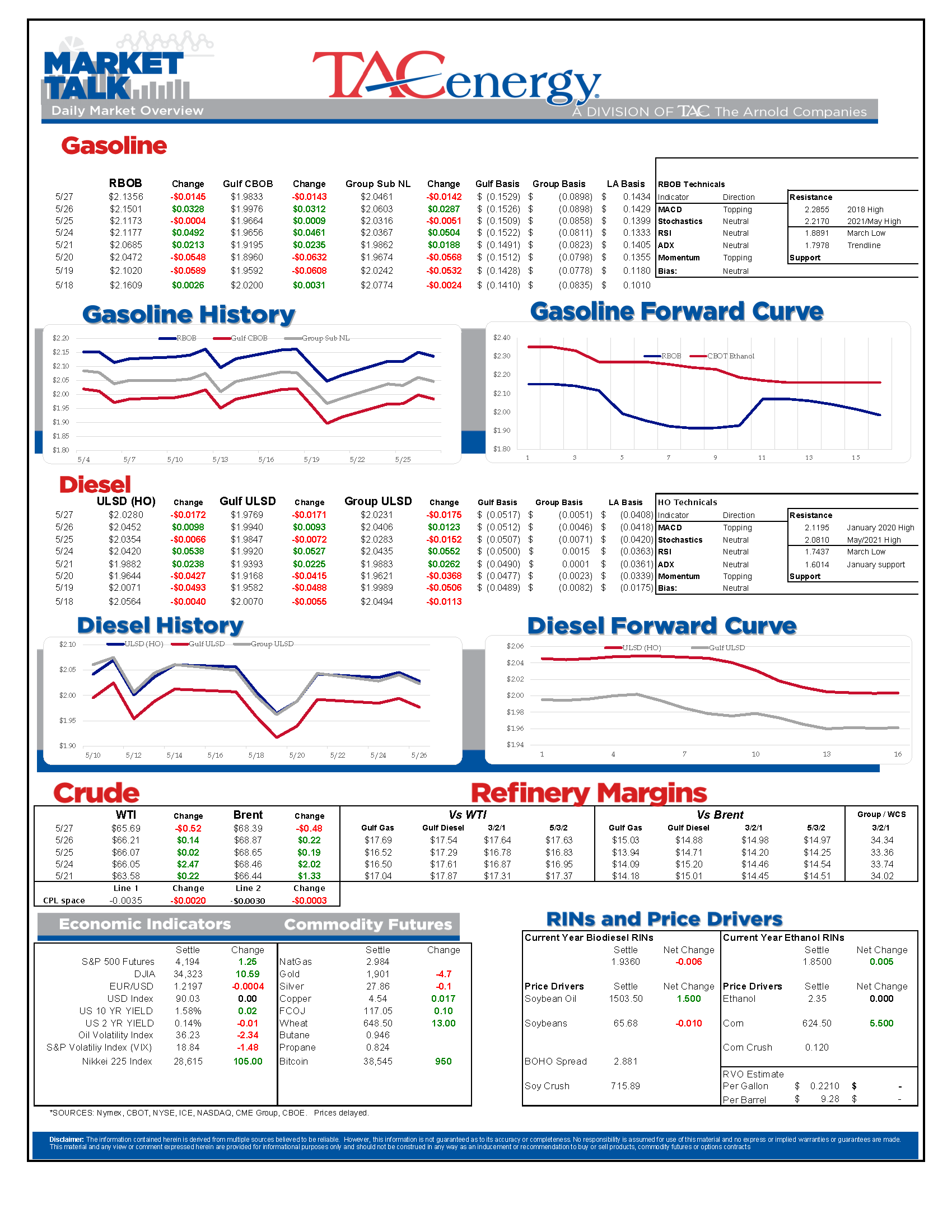Diesel Supplies Decline For Seventh Straight Week

The choppy back and forth action continues with a Wednesday’s price rally largely wiped out in the early going Thursday. The pattern seems to be that if prices are going up, we’ll chalk it up to stronger demand, if they’re down, it will be blamed on a possible new deal with Iran.
While the market seems to be going nowhere, it’s been a huge week on the climate front with two potentially landmark events both happening Wednesday.
A Dutch court ordered Shell (aka Royal Dutch Shell) to cut its carbon emissions by 45% by 2030 in a ruling announced Wednesday. The ruling didn’t say how Shell was supposed to accomplish that, but apparently the company believes fire-selling its refineries is an option. After selling off its Anacortes and Deer Park facilities in the past few weeks, the company announced Wednesday it would also be selling its Mobile AL refinery to specialty refiner Vertex.
Exxon Mobil meanwhile saw at least two, and possibly three, board of directors seats won by an activist investor group pushing for the company to rethink its climate change strategy. What does that mean? Maybe not much in terms of operational changes as the fund controls only .02% of the company’s shares, and the 2-3 board seats won’t be enough to create any majorities. That said, it’s a clear victory in terms of changing sentiment from investors, and quite possibly the loudest moment yet in the crescendo of the great energy transition.
Betting on a bailout? A Reuters report Wednesday said that Delta’s refinery arm has stopped buying RINs in a bet that the white house will offer relief as those credits have surged more than $1/RIN so far this year. We did see PES try a similar strategy a few years ago, and get its RIN obligation wiped out in Bankruptcy court, which seemed to work until they blew up their refinery. RINs were under selling pressure before this report moving 2-3 cents lower on the day, but rallied following its release of this report and wiped out most of those early losses.
In fundamental news from the weekly DOE Report: Diesel supplies declined for a seventh straight week. Considering we’re in the traditional seasonal doldrums for diesel demand, and yet days of supply is below 30, you might start being concerned with securing your diesel supply this fall if you haven’t already.
The DOE’s gasoline demand estimate reached a new post-COVID high, and actually surpassed the levels we saw this week in 2019. It is possible to write off that jump to restocking efforts in the wholesale fuel arena following the great Colonial Panic buying spree the prior week.
The PADD 1 & PADD 3 gasoline inventory charts didn’t change much last week, proving that fixing the near-week-long shutdown of Colonial will take much longer than one week. Outages are dwindling in the South East, but returning to normal supply will still take another few weeks.
While refiners are still operating below capacity, that reality of the time it takes to bring new supply to the consumer is a good warning as both gasoline and diesel days of supply are now back to average levels and demand is continued to climb this summer. The rash of refinery closures and conversions over the past month has left the U.S. refined product market with less of a capacity cushion than it’s had in a decade, and more regional shortages & price spikes could be coming as a result.
News & Views
View All
Energy Futures Are Caught Up In Headline Tug-O-War This Morning
Energy futures are caught up in headline tug-o-war this morning with Canadian oil production concerns and a positive US GDP report trying to push prices higher while sinking Chinese demand worries and Gaza ceasefire hopes are applying downward pressure. The latter two seem to be favored more so far this morning with WTI and Brent crude oil futures down ~45 cents per barrel, while gasoline and diesel prices are down about half a cent and two cents, respectively.
No news is good news? Chicago gasoline prices dropped nearly 30 cents yesterday, despite there not being any update on Exxon’s Joliet refinery after further damage was discovered Wednesday. Its tough to say if traders have realized the supply situation isn’t as bad as originally thought or if this historically volatile market is just being itself (aka ‘Chicago being Chicago’).
The rain isn’t letting up along the Texas Gulf Coast today and is forecasted to carry on through the weekend. While much of the greater Houston area is under flood watch, only two refineries are within the (more serious) flood warning area: Marathon’s Galveston Bay and Valero’s Texas City refineries. However, notification that more work is needed at Phillip’s 66 Borger refinery (up in the panhandle) is the only filing we’ve seen come through the TECQ, so far.
Premiums over the tariff on Colonial’s Line 1 (aka linespace value) returned to zero yesterday, and actually traded in the negatives, after its extended run of positive values atypical of this time of year. Line 1’s counterpart, Line 2, which carries distillates from Houston to Greensboro NC, has traded at a discount so far this year, due to the healthy, if not over-, supply of diesel along the eastern seaboard.
Click here to download a PDF of today's TACenergy Market Talk.

WTI And Brent Crude Oil Futures Are Trading ~$1.50 Per Barrel Lower In Pre-Market Trading
The across-the-board drawdown in national energy stockpiles, as reported by the Department of Energy yesterday, stoked bullish sentiment Wednesday and prompt month gasoline, diesel, and crude oil futures published gains on the day. Those gains are being given back this morning.
The surprise rate cut by the People’s Bank of China is being blamed for the selling we are seeing in energy markets this morning. While the interest rate drop in both short- and medium-term loans won’t likely affect energy prices outright, the concern lies in the overall economic health of the world’s second largest economy and crude oil consumer. Prompt month WTI and Brent crude oil futures are trading ~$1.50 per barrel lower in pre-market trading, gasoline and diesel are following suit, shaving off .0400-.0450 per gallon.
Chicagoland RBOB has maintained its 60-cent premium over New York prices through this morning and shows no sign of coming down any time soon. Quite the opposite in fact: the storm damage, which knocked Exxon Mobil’s Joliet refinery offline on 7/15, seems to be more extensive than initially thought, potentially extending the repair time and pushing back the expected return date.
There are three main refineries that feed the Chicago market, the impact from one of them shutting down abruptly can be seen in the charts derived from aforementioned data published by the DOE. Refinery throughput in PADD 2 dropped 183,000 barrels per day, driving gasoline stockpiles in the area down to a new 5-year seasonal low.
While it seems all is quiet on the Atlantic front (for now), America’s Refineryland is forecasted to receive non-stop rain and thunderstorms for the next four days. While it may not be as dramatic as a hurricane, flooding and power outages can shut down refineries, and cities for that matter, all the same, as we learned from Beryl.

